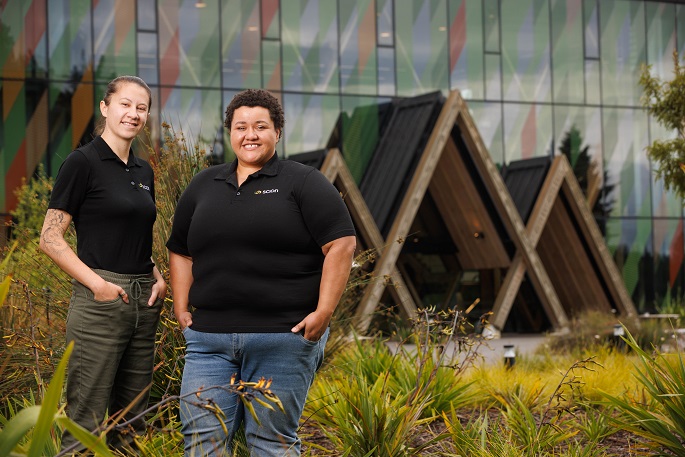While global leaders discuss how to respond to “climate tipping points” at the World Economic Forum’s annual meeting in Switzerland this week, one young science leader at Scion has emerged as an ambassador for the bioeconomy.
Dr Angelique Greene has been appointed as a Bioeconomy Youth Champion for the International Advisory Council on Global Bioeconomy (IACGB) in the Asia-Pacific region – and she’s now on a mission to gather more like-minded young people to grow awareness about the benefits of the bioeconomy for communities, the climate and the environment.
She joins Kokuke Shiraishi from Kyoto University in Japan in co-leading the IACGB’s regional bioeconomy group for youth.
Working together, they are recruiting researchers and young leaders to learn more about how youth are involved, understand and engage with bioeconomies in their own countries.
Two workshops are on the horizon for the group. It's hoped the first can be held this year in Rotorua, setting the stage for a second workshop in Kyoto, Japan, in 2025.
The first workshop will focus on developing strategies for surveying and collecting data from young people across the Asia-Pacific region. The goal for the second is to create a culturally relevant and impactful study that can guide policy decisions and the transition to a bioeconomy.
Insights gathered will be instrumental in helping countries respond to the changes that are already underway. Bioeconomy is not just a buzzword; it encompasses technologies such as biotechnology and sustainable agriculture that are crucial for solving the pressing issues related to climate change.
With Scion helping New Zealand transition to a circular bioeconomy, Angelique and fellow Bioeconomy Youth Champions will help to assess the workforce pipeline, bioresource availability, and training needs in different regions.
Angelique says her role reflects her commitment as a scientist to create a more sustainable future, while also highlighting the importance of involving the younger generation in shaping global policies that will affect their future.
“The issues we're focused on matter a lot to everyone around the world, but specifically to those who are most impacted by the effects of climate change.
“In our Asia-Pacific region, Asia is the most populated area of the planet, and the Pacific Islands are often underrepresented on global issues. I'm strongly advocating for diverse indigenous populations that would traditionally be marginalised to be part of the conversation and have a voice.”
Scientist Ki-Taurangi Bradford from Scion’s Te Ao Māori Research Group is the latest to join Angelique and her group who are actively recruiting members from countries such as Samoa, Japan, Australia, Indonesia, Vanuatu, Philippines and Fiji.
These countries represent a range of cultures, customs, and economic situations. Their indigenous communities also possess valuable knowledge about sustainable living and resource use, which can inform global bioeconomy strategies.
Ki-Taurangi says she feels very motivated to contribute to the team.
“I believe that the bioeconomy, with its potential to address climate change, promote inclusivity, and empower indigenous communities, aligns with my values and aspirations for a more equitable and sustainable future.”
Before embarking on the youth survey, Angelique says a focus for the group will be asking if the terminology being used is correct for particular countries.
“You might go into one country and say ‘bioeconomy’ and people will laugh and tell you they've been actively living the principles of a bioeconomy for thousands of years. It's not a new concept for indigenous cultures.
“Even a few hundred years ago, people lived off the resources of the land and used every part of things. In places like Samoa, it's still how many people live their lives. This is why it's important to have diverse global voices in the group.”
In addition to workshops, Angelique and Kokuke will attend the Global Bioeconomy Summit hosted by the IACGB in late 2024 where they will share their work and experiences from the Asia-Pacific group. These global gatherings foster a sense of community, underlining the importance of collaboration in addressing the world's most pressing challenges.
Angelique’s work extends beyond her role as a Youth Champion.
She is the project leader for the Waikato University-led MBIE-funded Amiomio Aotearoa project at Scion. This project focuses on building a circular economy in New Zealand by exploring sustainable recycling strategies for plastics.
A key aspect of Angelique’s research involves enzymatic plastic degradation, which offers a more sustainable and cleaner method for recycling plastics.
Current mechanical or chemical recycling methods can only be repeated a limited number of times or can require harsh chemicals.
Angelique’s approach uses enzymes as bio-catalysts to break down plastics into their monomer components. These monomers can be used for energy production or to create new bioplastics, significantly reducing waste and environmental impact.
“It’s work in the biotechnology space that we know will become increasingly important as we aim to move away from being so dependent on fossil fuels to create products,” says Angelique.



0 comments
Leave a Comment
You must be logged in to make a comment.